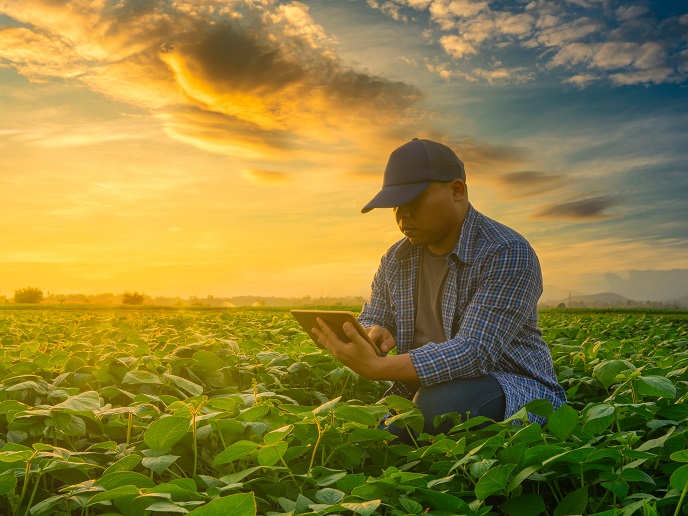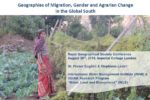AGRUMIG works in seven countries (China, Ethiopia, Kyrgyzstan, Moldova, Morocco, Nepal and Thailand). The project seeks to understand a range of economic, institutional, cultural and agro-ecological factors that mediate the outflow of labor from rural areas; explain how demographic changes feed back into reshaping rural transformation in these places; and challenge our thinking on what are the best policy and practice approaches to governing migration in these contexts. Our emphasis is away from regulating the movement of people to harnessing flows of knowledge and finance as a result of migration to help leverage more equitable agrarian change, including tackling structural constraints and stresses on economic development, such as gender inequality and youth exclusion. Our overall aim is to identify policy and practice interventions that harness migration processes and outcomes to stimulate more sustainable, inclusive and equitable growth in rural areas, and reduce the distress so often associated with migration decision-making.
AGRUMIG is part of the MARIS network (Migration, Agriculture and Resilience: Initiative for Sustainability)
Methods:
AGRUMIG uses survey and participatory tools to examine the drivers of migration and impacts of migration on the rural sector in seven countries across Asia, Africa and Europe. The project employs a qualitative comparative analysis method to identify key contexts in which unique relationships exist between migration and rural transformations. In parallel, we are engaging with policymakers and practitioners across diverse governance environments, establishing dialogues, undertaking literature reviews and conducting key informant interviews to understand how those constructing and implementing policies and practices (on both migration and rural agrarian change) can help mediate future development approaches and achieve more positive impacts.
Impacts:
A key contribution of the project is the identification of strategies that promote safer and more regular migration through supporting change in sending regions – establishing, in effect, a “positive migration” philosophy. AGRUMIG will outline longer term and more evidence-based governance solutions, supported by comparative analysis and tangible indicators that are sensitive to the position and role of migration within larger agro-livelihood systems. AGRUMIG will also analyze existing contexts and governance regimes on which future responses will need to build, including labor treaties and/or EU partnership agreements, national migration and/or agrarian policies, overseas aid policies and directions as well as initiatives taken at a more grassroots level by diasporas and/or returnees themselves.
The project is organised according to the following five work packages:
WP 1 Project management
Leading partner: SOAS University of London
Objectives:
- Manage the project legally, contractually, financially and administratively
- Ensure good quality communication between participants
- Ensure high quality reporting of the project results via deliverables and EC reviews
- Ensure successful dissemination, impact and ‘take up’ of project knowledge
- Organise five Project Meetings
- Organise the qualitative comparative analysis (QCA) process
WP 2 Agriculture and migration research
Leading partner: University of Birmingham
Objectives:
- Analyse the relationship between both economic, cultural and environmental factors that shape migration patterns from agricultural communities at a local level.
- Analyse how the process of migration itself impacts the agrarian economy, including the (re)production of inequality, changing gender and generational roles, the impact of labour scarcity on production practices, changes in how resources are managed, and the acquisition of agro-ecological knowledge.
- Assess how this two-way interaction between migration and agrarian/rural change affects the longer-term trajectory of migration, including the propensity of individuals to increase migration, engage in a new form of migration, or return to their homes.
- Apply a QCA method to combine data from 19 regions in 7 countries to assess the combination of factors which shape the relationship between migration and agricultural/rural change under diverse economic, institutional, cultural and agro-ecological contexts.
WP 3 Migration governance options research
Leading partner: University of Birmingham
Objectives:
- Review the activities of state or non-state governance actors with a direct involvement in the regulation of migration including government entities across scales, as well as immigration and labour laws of receiving regions, bilateral labour agreements, and supranational governance actors such as the EU, ILO and IOM.
- Review the activities of the governance regimes which shape the conditions of migration, including workers’ education and rights, including actions by governments and NGOs across scales, as well as governance actors who can shape migration pathways in negative ways, e.g. intermediaries who stand between employers, the regulatory authorities and migrants themselves.
- Identify the practices and policies of actors who are not directly engaged in migration governance, yet whose decisions and actions significantly shape the trajectory of farming systems, non-farm rural livelihoods and wider political-economic change in agrarian communities that are a source of migrants. This includes for example, agricultural sector policies and practices, overseas development interventions, the practices of global agribusiness and the role of the media and education system in shaping livelihood aspirations. Identify how these multilevel governance actions shape the outflow of labour and the decisions of farmers in terms of how they distribute household resources (especially labour) between the agricultural sector and international labour markets, particularly when faced with larger structural barriers grounded in class, gender and social groups.
WP 4 Stakeholder interaction: policy dialogues and action plan formulation
Leading partner: International Water Management Institute (IWMI)
Objectives:
- Under the umbrella of MARIS (www.maris.iwmi.org) expand and further develop a functioning network of research, policy and practice institutions and associations working on migration governance at the interface of outmigration and agricultural transformation.
- In each country, constitute national policy dialogues under MARIS that explore and highlight priority policy issues on links between migration governance and agricultural transformation. From these dialogues, establish working groups to contribute to the AGRUMIG-wide community of practice.
- Working closely with key Knowledge Partners in three of the seven countries (Kyrgyz Republic, Nepal and Thailand), hold national stakeholder policy dialogues that can identify key pathways and support innovative proposals to identify best practiced and strengthen future migration governance and agricultural transformation policies across a range of
environments.
WP 5 Impact and uptake: migration governance opportunities and instruments
Leading partner: International Water Management Institute (IWMI)
Objectives:
- Bringing innovations in migration governance to mainstream policy and practice in target countries through a combination of policy advocacy, knowledge dissemination and practical demonstration.
- Providing succinct knowledge products on migration governance innovations in the public domain through continued dissemination via social media under the MARIS network.









